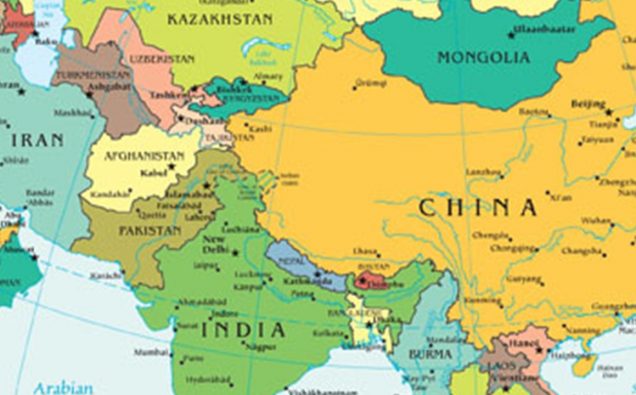
A map zooming on Pakistan and its neighbors sourced from a larger : CIA world map
While China is investing billions of dollars to stimulate Pakistan’s economic development through mutually beneficial corridor to the Gulf region, Russia has offered to expand military cooperation to the Cold War adversary.
In recent months, Moscow has hosted a series of meetings with top Pakistani officials in a new outreach to what it calls a “geo-strategically important” country. According to Pakistani media, Islamabad and Moscow have scheduled a calendar of regular engagements this year.
In another interesting development, India’s ultra-nationalist Prime Minister Narendra Modi will visit China this for talks with President Xi Jinping even as the two large countries remain locked in a spate of conflicts. But Beijing has time-tested and wide-ranging close ties with Islamabad as reflected in the fast-progressing China Pakistan Economic Corridor – a centerpiece of Beijing’s strategic lines of communication with the world.
The developments take place as the United States and Pakistan struggle to overcome their differences over some of the key bilateral and regional issues and Afghanistan remains stuck in multiple troubles.
Meanwhile, the U.S.-Russia relations also continue to deteriorate.
On the other hand, U.S.-China trade relations are also tense. The United States, which has developed close ties with both India and Pakistan, and has a relationship of economic interdependence with China, has deep interests in the region, particularly in the outcome of the festring Afghan war.
The latest Russian offer to expand defense and security ties with Pakistan came during Army Chief General Qamar Javed Bajwa’s visit to Moscow.
Bajwa held talks with Colonel General Oleg Salyukov, Commander Russian Federation Ground Forces, at Kremlin Palace.
According to the Pakistani military media unit, the army chief was presented a guard of honor. He laid a wreath at the Tomb of the Unknown Soldier.
“Pakistan is a geo-strategically important country and Russia is keen to expand its existing bilateral military to military cooperation,” the Russian Ground Forces Commander said.
Gen Bajwa thanked General Oleg and said that Pakistan reciprocates desire of enhanced bilateral military engagements.
He said that Russia had recently played a positive role to help resolve complex situations in the region.
He said Pakistan will continue to play its part in keeping conflicts away from the region and “seek approaches which bring regional convergences into play rather than the divergences”.
Foreign Minister Khawaja Asif visited Moscow early this year while National Security Adviser Lt-Gen (retd) Nasser Khan Janjua also travelled to Russia.
The Russian offer brings Pakistan an opportunity to diversify its foreign policy options after the U.S. deepened its strategic ties with India.
Meanwhile, the United States and Pakistan held talks this week to find convergences on some of the tough bilateral and regional issues as part of their own regular engagements.
The two post-9/11 allies, who worked closely in the fight against al-Qaeda, have apparently made little progress to recover their ties after President Donald Trump publicly accused Pakistan of giving refugee to the Afghan Taliban and not doing enough to reciprocate the U.S. assistance.
Islamabad has rejected the allegations, and according to leading international experts on South Asia, remains the key to stabilizing Afghanistan through its support for the U.S. mission and Afghan peace effort.
Pakistan has expressed serious concern about Indian role in sponsoring terrorism in its Balochistan province from Afghanistan and cites a number of proofs including the capture and confessions of an Indian spy to create troubles for the country.
Kabul, on the other hand, shown no improvement in its governance and the latest challenge of ISIS terror has multiplied its problems.

















Very good report,well done Luqman, I can see a mature journalist in you through this report, great effort.
saeed@Australia